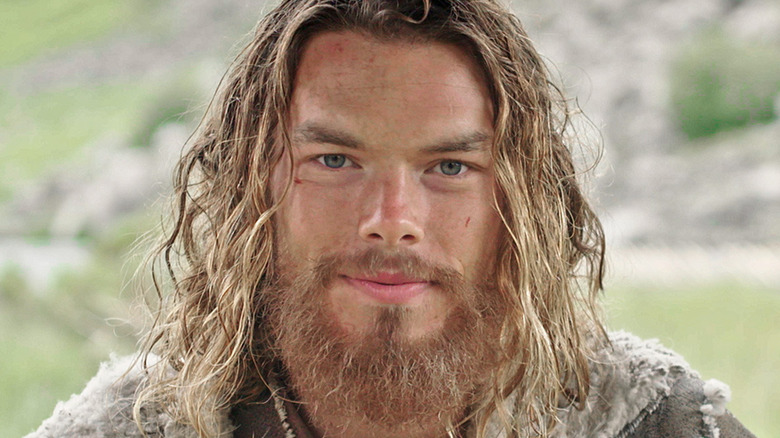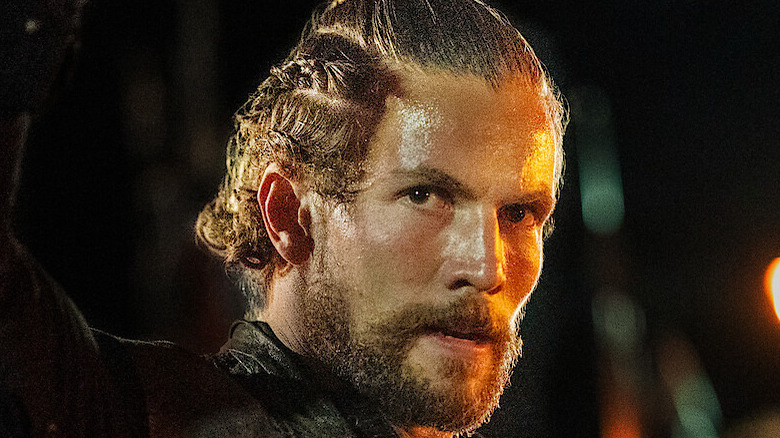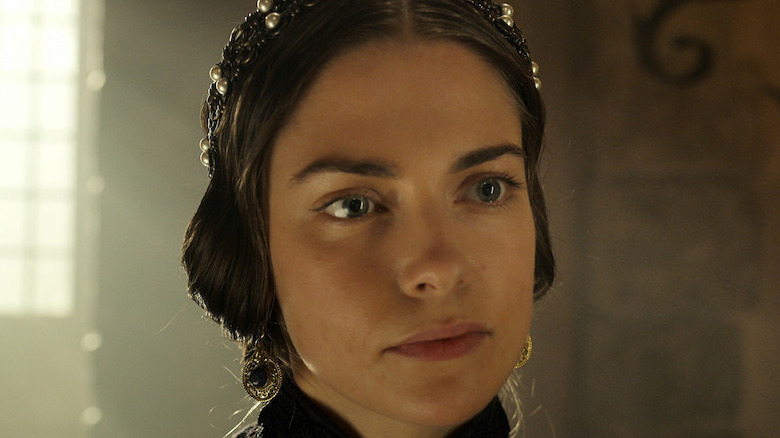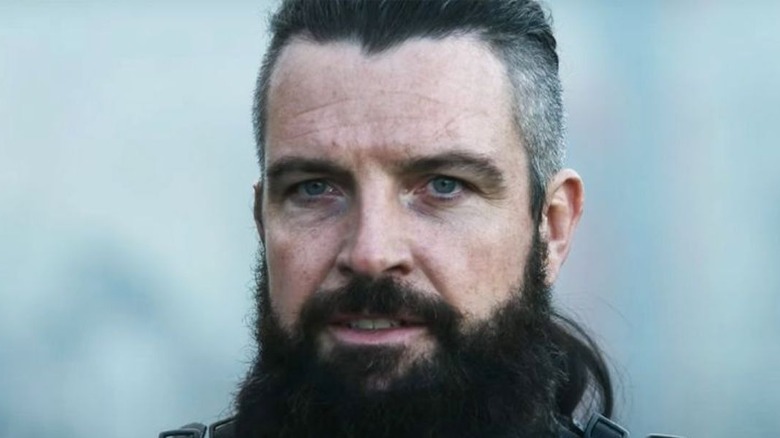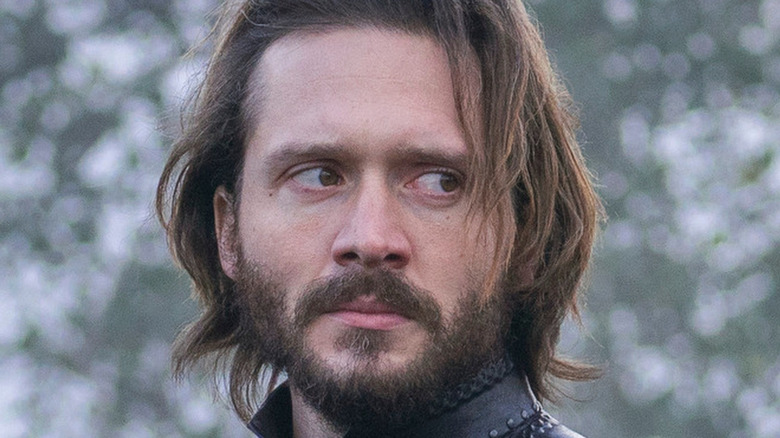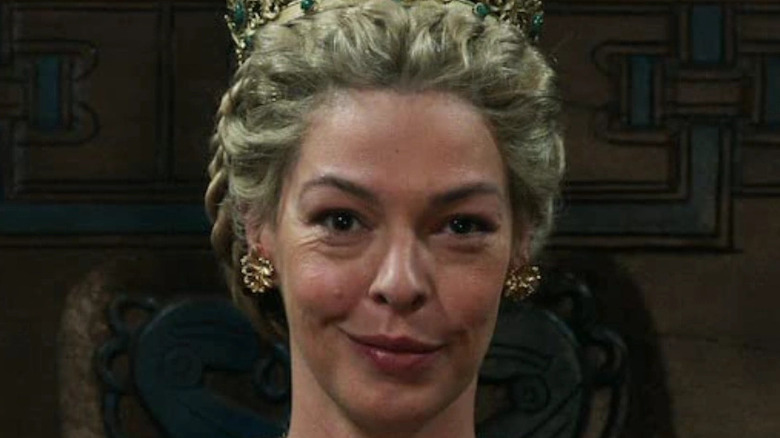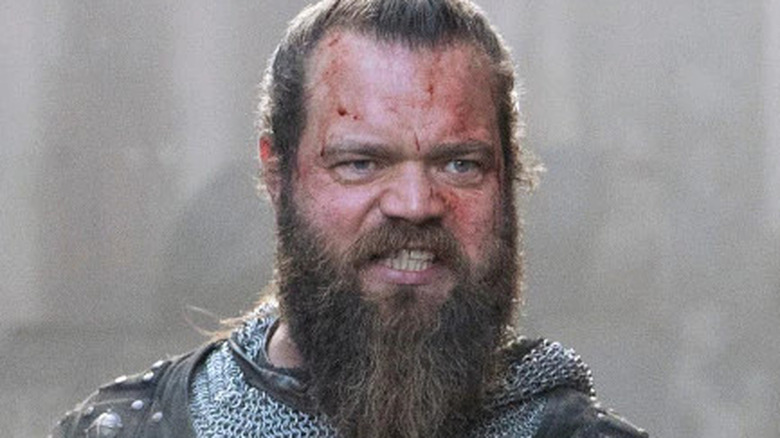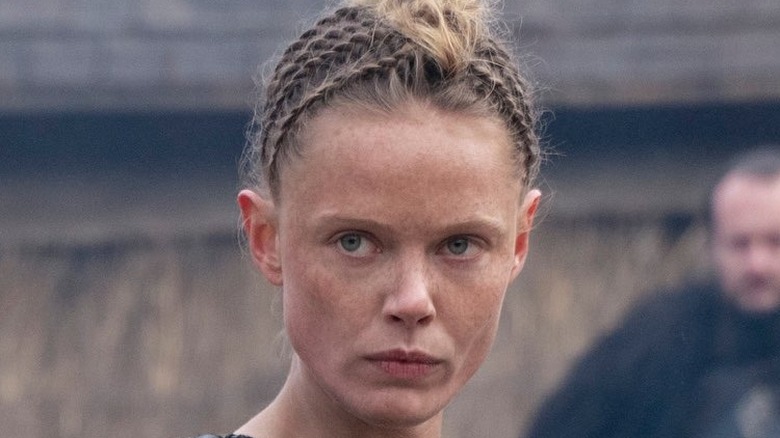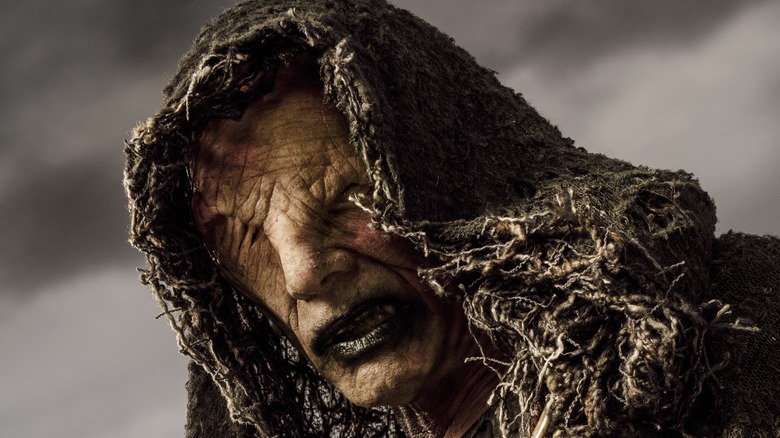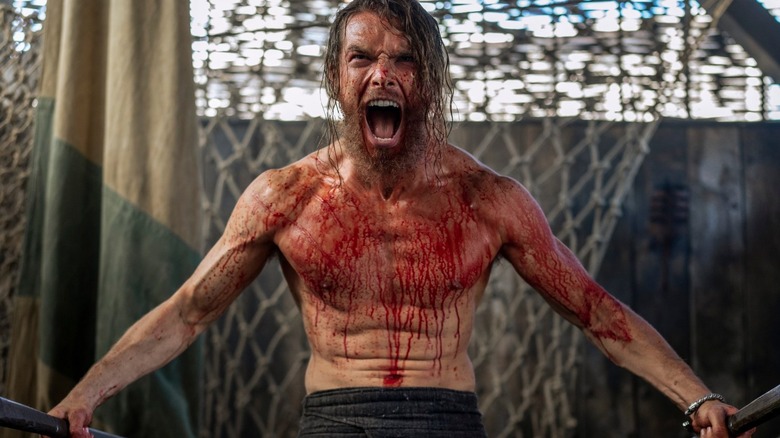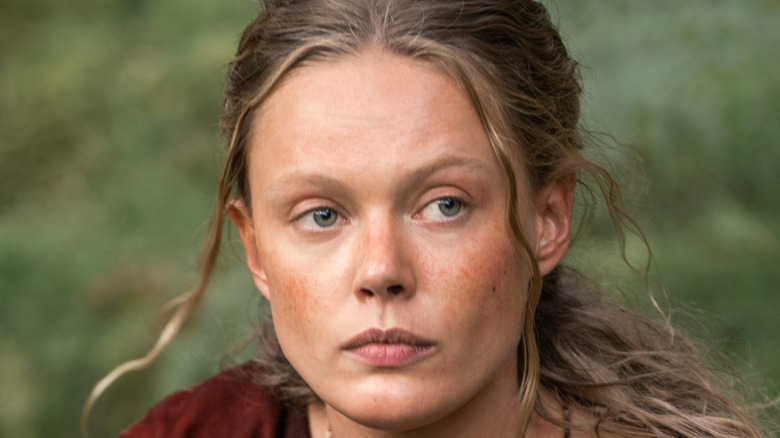Biggest Unanswered Questions From Vikings: Valhalla
After six brutal, bloody, badass seasons, History's "Vikings" finally hung up its axes and came to an end in 2020. Though the berserker melee of twists and turns surrounding the lives and legends of Ragnar and Lagertha is over, 2022 brought us a fresh Scandinavian saga in the form of "Vikings: Valhalla." Set almost 200 years after the events of "Vikings," the new series chronicles some of the most historic moments toward the end of the Viking Age, beginning with the St. Brice's Day massacre and carrying through the legendary Battle of Stamford Bridge. And though the series is set against the end of an era, its first season finale made it clear that these Vikings still have plenty of stories to tell.
By the end of its first season, "Vikings: Valhalla" had killed off the majority of its major, titular Northmen, and whole hosts of Saxons with them. The few major characters that remained standing through it all were each left in their own morass of uncertainty and upheaval. The series left fans with a host of lingering questions about its characters and the state of the world in which they'll inherit. Here are the most nagging of them all, the biggest unanswered questions from "Vikings: Valhalla."
Who played who at Kattegat?
The first season finale, "The End of the Beginning," centered around the battle for Kattegat, the capital of Viking Norway. In keeping with the series's dedication to portraying real-world complexities in morality and politics, the battle is anything but simply good vs. evil. Sure, fans were unlikely to root for the conniving Jarl Olaf or the borderline extremist Jarl Kåre, but the issue was muddied by human sacrifice, brutal civil war, and a flurry of double- and triple-crosses on both sides. Just who played who, in what order, and why, all have major ramifications for the surviving characters.
Put simply: Harald betrayed Kattegat, then betrayed Olaf and Kåre for Kattegat, but Kåre had already betrayed Harald and fed him false information, though Olaf had already betrayed them both, knowing that Harald would betray him and so used that betrayal to weaken both Kattegat and Kåre's army, thereby leaving him the strongest power when the dust settled (or so he thought). But even when that valknut is unraveled, many questions remain. Why did Olaf let Harald live after his double-cross? Is Olaf truly the Christian fundamentalist he claims to be? Is Harald the Christian he claims to be? Both betrayed fellow Christians for pagans or pagan-sympathizers. Was Kåre truly blessed with second sight, implying the pagan Seer was still alive? If so, was Kåre actually right? Perhaps most importantly of all: Was Olaf a master manipulator or just lucky?
Who played who in London?
Meanwhile, on the other side of the North Sea, "The End of the Beginning" followed another power struggle: The battle for the throne of England. Though compared to Kattegat, this battle was fought more with machinations than masses of troops, the fight was no less treacherous and no less significant. The principal players were the interim Viking King Forkbeard, the Viking Queen Ælfgifu, the Norman Queen Emma, and royal advisor Godwin. If the Harald/Olaf/Kåre knot was convoluted, then the competition in London was the world's biggest ball of twine.
Just as at Kattegat, the exact level of each player's duplicity will presumably have a major bearing on the series's future. It's clear that Forkbeard, Emma, and Godwin all conspired to remove the troublesome Ælfgifu from the picture, but just how far they were in league with each other matters. One of the key moments that began the conspiracy was Godwin's murder of Edmund, Emma's stepson. As Emma loved him deeply, it's difficult to imagine she was in on that particular part of the plot. The scheme also took Forkbeard away from the throne and back to Norway, conveniently leaving only Emma in England and with a claim to the throne. Could it be that Emma and Godwin conspired behind Forkbeard's back? And for Godwin, the newly appointed Earl of Wessex, could he be setting his sights on an even higher position?
The state of an empire
Historically, the biggest Viking settlements outside of their native Norway, Sweden, and Denmark were in Iceland, Greenland, the British Isles, and Normandy, France. At the end of the first season of "Vikings: Valhalla," essentially every one of those territories is in a state of political flux and faces a number of questions about its future — aside from Iceland, which seems to be doing just fine.
England is left in the hands of Emma, a non-Viking, but — being Norman — is descended from them. Though she is married via Christianity to the rightful King Canute, he is also married to Danish Queen Ælfgifu via pagan tradition. She is neither true Viking nor true Saxon, and so her hold on England is tenuous. Canute is away in his native Denmark to repel a Rus invasion from the east, meaning Denmark is likely in the hands of a temporary ruler while Canute is at war, probably a jarl. Norway was just ravaged by civil war, much of its population lost, Kattegat has fallen, and now Forkbeard has sailed into the city to take it, meaning Norway will likely have three different kings in the span of a day. Greenland, too, faces an uncertain future. Though it is only mentioned in the series, it's clear that Greenland's leadership has always been questionable, especially now that Leif Eriksson has left.
Will Emma let Godwin survive?
Though Emma's claim to the English throne is both tenuous and challenged, at the end of Season 1, she nonetheless has the highest combined score when it comes to A. rightful claim and B. actually being in England. With Canute and Forkbeard away, the earls' rebellion stymied, Ælfgifu de-powered and at bay, and Edmund dead, Emma is likely to lead England solo — at least as long as a drama like "Vikings: Valhalla" will let her. That gives her, at least for the moment, an unparalleled amount of authority to enact her will. Depending on her level of involvement in Edmund's death — again, probably none — the first item on her docket will most likely be avenging her beloved son.
The clever and ever-perceptive Emma noticed the small stab wound on Edmund's body and immediately accused Godwin of her son's murder. Assuming she was not involved in this plot, she clearly has her primary suspect. Will Emma have Godwin killed as revenge? And — as is always the issue in this tale of honor, responsibility, and competing allegiances — can she kill him? Godwin is, after all, the new Earl of Wessex, and a trusted advisor of Forkbeard. Would Forkbeard kill Emma in retribution? And might Emma's practicality convince her to keep the clever, Little Finger-esque Godwin alive in her own employ?
Will Emma let Ælfgifu survive?
Godwin is not the only conspirator who may soon find themselves on Emma's chopping block. The same is true for Ælfgifu, the queen of Denmark, and the woman who happens to also be married to Emma's husband. Despite Emma momentarily having the upper hand over Ælfgifu, both women are in equally precarious positions. While King Canute is away in Denmark, Emma can never be sure where his love truly lies. Further, she can't forget that her marriage was a rushed one, and one performed for political gain. For all she knows, Canute cares nothing for her and is madly in love with Ælfgifu, which would make the act of killing her tantamount to suicide whenever Canute returns.
On the other hand, Aethelred's heir, Edmund, recently died, and Ælfgifu still has two sons — both with Canute. To Emma, a monarch attempting to consolidate power, leaving Ælfgifu alive would be like leaving her social security number and bank account information lying on her kitchen table and inviting a thieves' guild to become roommates. Ælfgifu is in jeopardy, but so is Emma. Killing the mother of Canute's sons — not to mention Forkbeard's grandsons — might just invite even worse than a guild of thieves into her home.
Olaf's fate
From the show's first episode, "The Greenlanders," most viewers likely hated Olaf's guts. After establishing Leif and Freydis as our chief protagonists, the show made it clear that Freydis has suffered an immense amount of trauma. In fact, if someone solely watched the first episode, they would be logical in assuming that the whole series revolved around Freydis' quest for revenge. But the following episodes are quick to give Freydis another avenue for healing in the form of her religion and the quest to become a shield-maiden. Meanwhile, Olaf persisted throughout the entire season, through some mixture of wiles and luck.
In the final moments of the season finale, Olaf is finally left in a position that threatens to use up all of his remaining luck, and his wiles alone may not be enough to save him. About a minute after taking Kattegat and proclaiming himself the new King of Norway, Olaf receives the news that Forkbeard's fleet has sailed into the harbor. For Olaf, the jarl who betrayed Forkbeard's son, King Canute, the fleet likely means his death. In his last moments on screen, Olaf throws off his regal cloak, grabs an ax, and runs off into Kattegat. Is he about to die a warrior's death in combat or will he be able to flee to safety? Is there any such place in a country full of his enemies?
If you or anyone you know has been a victim of sexual assault, help is available. Visit the Rape, Abuse & Incest National Network website or contact RAINN's National Helpline at 1-800-656-HOPE (4673).
Where will Freydis and Harald go?
During the sacking of Kattegat, Freydis and Harald escape the city on horseback, riding into the mountains of untamed Norway. Like Olaf, they face the twofold question of where to go and where can they even go. For Olaf, the issue is the infamy gained during his and Kåre's conquest of Norway and the extermination of its pagan populace. For Freydis and Harald, the issue is the opposite: Most of their allied cities and settlements have been conquered.
While Harald is Christian, he has made it clear that Freydis is more important to him than his faith, and so even if he could find sanctuary in Christian Norway, he wouldn't without his beloved. On top of that, Freydis is more pagan than ever, having embraced her prophesied role as the "Last Daughter of Uppsala," i.e. a paladin for Norse paganism. With none of her fellow Greenlanders left alive save for a bloody, berserk Leif, and with Norway heavily Christianized, Freydis will have a hard time finding safety anywhere close to Kattegat. Creator Jeb Stuart did tease that Harald and whoever will still follow him have in store "a long journey from that point. ... We're going to take them out of Scandinavia." Where they might end up is anyone's guess.
Freydis and the gods
Throughout its first season, "Vikings: Valhalla" was deliberately nebulous in its portrayal of various religions and supernatural phenomena. At times, the visions seen by people like Freydis and Kåre seemed almost factual, while at other times, it seemed obvious that any perceived otherworldliness was the simple product of zealousness and hallucinogens — a well-documented historical tradition. Though the series going forward could certainly continue to equivocate when it comes to the existence of magic in its world, it may become harder and harder to do as Freydis' story progresses.
For one thing, one of the most momentous occurrences in Freydis' life was her vision of the Seer, the prophet who played a role in "Vikings" almost 200 years earlier. For her to have seen the Seer as he actually appeared in "Vikings" would either take an astounding coincidence or the legitimate existence of magic. Even way back during the events of "Vikings," the Seer was allegedly centuries-old and his appearance, though possibly explainable by natural causes, appeared truly inhuman. It will be interesting to see where, if anywhere, "Vikings: Valhalla" decides to land on its own issue of magic realism, especially if Freydis is indeed the last sacred pagan champion in an increasingly Christian Northern Europe.
Leif and faith
Whether or not the crew behind "Vikings: Valhalla" ever takes a stand on the reality of magic in their world, the battle between competing religions is very real and a large part of the show's setting. The tension between Christian Vikings and pagan Vikings permeates the show's every episode, and forces most characters into choosing one mutually exclusive side or the other. The civil war in Norway, for example, is — at least on the surface — almost entirely a matter of Christianity combating traditional pagan beliefs. Few of the show's characters, therefore, were able to avoid choosing a side in the conflict, though series protagonist, Leif, was seemingly able to do so.
For almost the entirety of eight episodes, Leif performs his stone-faced outsider act for anyone who broaches the subject of the gods, and only drops the charade in the last moments of the season finale. When his lover, Liv, is ran through by Olaf, he holds her dying body in his arms. Seeking one final comfort before her death, she asks him if he believes in the old gods as she does. Though he hesitates, he eventually caves and reassures her — just moments too late — that yes, he follows traditional Norse paganism. But, thanks to a number of clues throughout the series, it's possible that Leif may be embracing Christianity and merely lied to Liv in a bid to ease her passing.
Which Leif remains?
Leif is a wild card in more than his religion. Throughout the series, his father's reputation precedes him, casting a shadow on every road he is forced to walk. His infamous father, Erik the Red, became a legend throughout the entire Viking world due to his berserker nature. He was a killer through and through, whether in wartime or peace, and his unhinged, bloody melees are what earned him the epithet "the Red." Leif, an apple from that Red Tree, is always forced to wonder how far from it he fell — or how close he remains.
Leif spends the majority of the season maintaining his cool, killing minimally and keeping his temper in check. It's not until Liv's death that the berserker inside him is truly unleashed. His whirlwind of axes leaves him soaked in blood and certainly hearkens back to tales of Erik the Red, but the truth may be more complex. His father's berserker temper may have ended with him, and Leif may be free from its influence — at least genetically. Instead, the savage fury in which Leif ends the season may simply be a relatively justified reaction to the death of his partner. It remains to be seen how Red Leif really is.
What year will it be?
It is likely that Season 2 of "Vikings: Valhalla" will take place either directly after or soon after the end of the first season, but it is far from a given. Showrunners jumped almost 200 years between the end of "Vikings" and the start of "Vikings: Valhalla," showing their willingness to skip through history to get to its meatiest parts. On top of that, the latter half of the season introduced the children and grandchildren of some of the show's main characters — one of the finale's final shots was one of Ælfgifu and Canute's two sons sailing with their grandfather, Forkbeard, to war.
Will Season 2 of "Vikings: Valhalla" shift, like the start of Season 1, from our dramatis personae to their children? Given the amount of story left to be told for Leif, Freydis, and Harald, it's unlikely. But a future season, whether it's Season 3 or even another spin-off, could certainly chronicle the children's crusade — perhaps somewhat literally, given the increasing percentage of Vikings who believe in Christ. Ultimately, the when, where, who, and how of future "Vikings: Valhalla" seasons are all up in the air, though the air is sure to be thick with smoke and the screams of Viking raiders.
